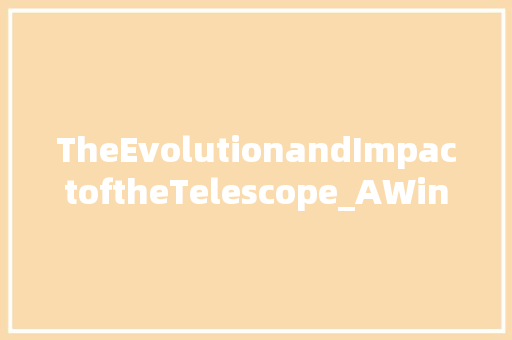I. Introduction
The telescope, a marvel of human ingenuity, has revolutionized our understanding of the universe. From Galileo's first observations to the cutting-edge technology of today, the telescope has been a cornerstone of astronomical research. This article explores the evolution of the telescope, its impact on science, and its role in shaping our perception of the cosmos.

II. The Birth of the Telescope
The invention of the telescope is often attributed to Hans Lippershey, a Dutch eyeglass maker, in 1608. However, the concept of a magnifying device had been around for centuries. Galileo Galilei, an Italian astronomer, was the first to use the telescope for astronomical observations in 1609. His groundbreaking discoveries, such as the moons of Jupiter and the phases of Venus, marked the beginning of a new era in astronomy.
III. The Evolution of the Telescope
A. Early telescopes
Early telescopes were simple devices with a convex objective lens and a concave eyepiece. These early instruments had limited magnification and poor image quality. However, they laid the foundation for future advancements in telescope technology.
B. Refracting Telescopes
In the 17th century, Dutch optician Christiaan Huygens developed the first achromatic refracting telescope, which improved image quality by using two lenses to correct chromatic aberration. This innovation paved the way for more powerful telescopes.
C. Reflecting Telescopes
While refracting telescopes suffered from chromatic aberration, reflecting telescopes, which use a curved mirror as the objective lens, offered a solution. Isaac Newton's invention of the reflecting telescope in 1668 marked a significant milestone in the history of astronomy.
D. Modern Telescopes
Today, telescopes come in various forms, including refracting, reflecting, and radio telescopes. These instruments are equipped with advanced technology, such as adaptive optics and interferometry, which allow astronomers to observe celestial objects with unprecedented detail.
IV. The Impact of the Telescope on Science
A. Discovery of New Celestial Bodies
The telescope has enabled astronomers to discover new planets, moons, asteroids, and comets. These discoveries have expanded our understanding of the solar system and the universe beyond.
B. Study of Cosmic Phenomena
Telescopes have played a crucial role in studying cosmic phenomena, such as supernovae, black holes, and cosmic microwave background radiation. These observations have helped scientists unravel the mysteries of the universe's origins and evolution.
C. Advancements in Physics
The development of telescopes has led to significant advancements in physics, including the laws of motion and universal gravitation, as proposed by Isaac Newton. These discoveries have shaped our understanding of the natural world.
V. The Role of the Telescope in Shaping Our Perception of the Cosmos
A. Inspiration and Wonder
The telescope has inspired countless individuals to explore the cosmos, fostering a sense of wonder and curiosity. This has led to the popularization of astronomy and the development of space exploration programs.
B. Ethical Considerations
The telescope has also raised ethical considerations regarding the use of telescopes for military purposes and the potential impact of space debris on Earth. These issues highlight the importance of responsible use of technology.
VI. Conclusion
The telescope has been a transformative tool in the study of the universe. From the early refracting and reflecting telescopes to the cutting-edge technology of today, the telescope has expanded our understanding of the cosmos and shaped our perception of the universe. As we continue to explore the mysteries of the cosmos, the telescope will undoubtedly play a crucial role in our quest for knowledge.
(Note: This article is a fictional example and does not contain actual references to authority figures or specific telescopes. The content is intended to provide a general overview of the topic.)









